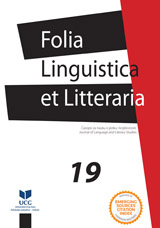THE ORIGINAL AND THE SIMULACRUM IN JULIAN BARNES’S ENGLAND, ENGLAND
THE ORIGINAL AND THE SIMULACRUM IN JULIAN BARNES’S ENGLAND, ENGLAND
Author(s): Loran GamiSubject(s): Theory of Literature, British Literature
Published by: Filološki fakultet, Nikšić
Keywords: simulacrum; original; hyperreal; replica; reality;
Summary/Abstract: England, England is one of the most interesting books by the British writer Julian Barnes. In the novel the magnate Sir Jack Pitman decides to create a replica of England on the Isle of Wight by building on that island the most representative sites of the ―old England‖. The article focuses on the relationship between the real and the simulacrum and how this relationship is explored in Barnes‘s novel. The novel can be read in the framework of the Baudrillardian concept of the simulacrum and the superiority of the simulacrum over the original, a concept which is at the heart of Baudrillard‘s thought. The article elaborates on the idea that the replica, the simulacrum, undermines a very important foundation in the way our thinking and judgments have been traditionally formed. It undermines the superior position the original has had in Western thought because the simulacrum is not anymore dependent on the original but acquires a life and identity of its own. It seems as if the original and the simulacrum merge into one and it is impossible to make a distinction between the two. The article also uses Eco‘s idea of hyperreality and how the ―completely real‖ becomes identified with the ―completely fake‖. The article discusses how in Barnes‘s novel the opposition between the hyperreal England and the ―real‖ England becomes blurred. Thus the simulacrum deconstructs the hierarchy that exists between the original and the replica. England, England seeks to destroy, or rather deconstruct, the hierarchy of the traditional opposition between the original and replica.
Journal: Folia Linguistica et Litteraria
- Issue Year: 2017
- Issue No: 19
- Page Range: 129-136
- Page Count: 8
- Language: English

